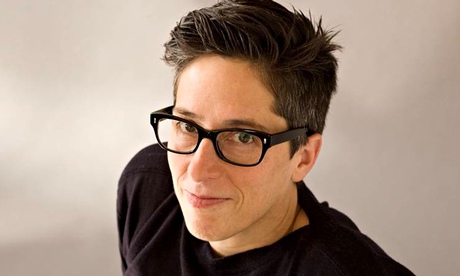
Graphic memoirist Alison Bechdel has been named one of 21 winners of a $625,000 MacArthur “genius” grant for “changing our notions of the contemporary memoir and expanding the expressive potential of the graphic form”.
Given out yearly, the no-strings-attached stipends are paid out over five years and are intended to allow recipients “maximum freedom to follow their own creative visions”. They are widely known as “genius” grants, and have gone in the past to literary names including Chimamanda Ngozi Adichie, Junot Diaz, and William Gaddis.
Bechdel, who explored her childhood in the acclaimed graphic memoir Fun Home, is joined this year by authors including the poet and translator Khaled Mattawa, for “giving voice to a vast [Arabic] literature largely unknown in the western hemisphere”, and the poet Terrance Hayes, for his “fluid, often humorous wordplay with references to popular culture both past and present in his subversion of canonical poetic forms”.
Recipients of the grants are chosen through what the MacArthur Foundation described as “a rigorous process that has involved thousands of expert and anonymous nominators, evaluators and selectors over the years”.
Getting the call was, said Bechdel, “crazy, like someone had almost hit me, like a physical blow”. “I thought I was going to faint,” she said. “I feel like I’ve been in a state of shock. Getting this kind of recognition from the MacArthur Foundation, I can feel it already changing my life. I’m having to adjust to the fact this has happened, so I must be doing something worthwhile. To have that kind of confidence put into my work is a huge gift, and I’m going to work very, very hard to live up to those expectations.”
Bechdel is known for her comic strip Dykes to Watch Out For, about the everyday lives of women in the lesbian community, as well as for her graphic memoirs. Fun Home describes how she came out to her parents, only to discover that her father had also had homosexual relationships, and for him to – she believes – kill himself.
Are You My Mother? expanded on her relationship with her mother, exploring, as the Guardian’s review put it, “her childhood, her love affairs, her interactions with two different therapists and, throughout it all, her efforts to get the recognition she has always craved from her mother”.
“I wrote this story about my father and it was painful at times to go back and remember things, to go back and recreate his character, to feel that loss,” she said, in an interview for the MacArthur Foundation.
Describing herself as “a cartoonist”, Bechdel said that what she loved about the medium was “the way you have access to these two different kinds of communication. There’s language, verbal language ... I love words, I love braiding, I love putting sentences together. But language remains symbolic; it still has to get filtered through our brains. Whereas drawing – it’s right there, it’s immediate, and you just assimilate it without having to think about it. I love having access to both kinds of communication when I tell my stories.”
The foundation said that Bechdel’s works “use the interplay of word and image to weave sophisticated narratives”, adding that the images in her memoirs “do not always correspond to or illustrate the words; rather, they mutually interpret or often tug against each other, creating a space between them that invites a multiplicity of interpretations”.
“With storytelling that is striking for its conceptual depth and complexity in structure as well as for the deft use of allusion and reference, Bechdel is changing our notions of the contemporary memoir and expanding the expressive potential of the graphic form,” said the foundation.
This year’s fellows also include mathematicians, historians, lawyers and scientists – all “exceptionally creative individuals with a track record of achievement and the potential for significant contributions in the future”, according to the organisation.
“Those who think creativity is dying should examine the life’s work of these extraordinary innovators who work in diverse fields and in different ways to improve our lives and better our world,” said the programme’s vice president Cecilia Conrad. “Together, they expand our view of what is possible, and they inspire us to apply our own talents and imagination.”

